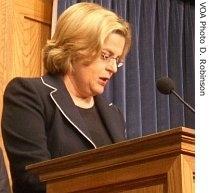2007年VOA标准英语-US Lawmakers Advance Legislation to Pressure Ir
搜索关注在线英语听力室公众号:tingroom,领取免费英语资料大礼包。
(单词翻译)
By Dan RobinsonCapitol Hill
23 May 2007
Legislation that would step up pressure on Iran's government has been advanced by two committees in the U.S. House of Representatives. VOA's Dan Robinson reports from Capitol Hill.
Approved by the committees on foreign affairs and financial services, the measures aim to make it steadily1 more uncomfortable and economically risky2 for Iran's government to continue its uranium enrichment program, which the United States believes is aimed at developing nuclear weapons.
The Iran Sanctions Enabling Act would establish a U.S. government list of companies investing at least $20 million in Iran's energy sector3, and remove some legal barriers for Americans who would choose to divest4 from those companies.
Democratic Congressman5 Barney Frank chairs the House financial services committee:
"It makes it very clear that the actions taken under this bill will be actions taken by the American people, by elected state governments, by elected state officials, by individuals acting7 with regard to their own money," said Barney Frank. "And in addition to the real impact this could have it makes a very important political point, that the revulsion at the way in which the Iranian government has conducted itself in so many aspects is widespread throughout the United States, it transcends8 partisan9, ideological10, ethnic11 and other bounds, and this bill gives voice to that.
Democratic Congressman Brad Sherman, a key critic of Iran in Congress, explains how the measure would make it easier for Americans to divest from Iran-invested companies or funds:
"It makes it clear that when states and localities divest, they are not blocking American foreign policy, conflicting with a foreign government, but rather they are furthering that policy and they are not just authorized12 they are encouraged to divest [from] companies investing in the Iranian oil sector," said Brad Sherman.
Congressman Frank says the Bush administration has urged that in moving the legislation through Congress, its sponsors ensure that it does not jeopardize13 U.S. efforts to get international support for diplomatic steps to deal with Iran's nuclear program.
Meanwhile, the foreign affairs committee approved legislation called the International Nuclear Fuel for Peace and Nonproliferation Act.
The bill proposes creation of an independent international nuclear fuel bank, a step Lantos says would remove what he calls the pretext14 Iran has given to justify15 its development of uranium enrichment technology it says is for peaceful purposes, but which could be for nuclear weapons:
"It is imperative16 that we keep nuclear weapons out of the hands of Iran, and provide a source of nuclear fuel for peaceful ends, to countries that are currently flirting17 with nuclear development programs," said Tom Lantos.
Lantos says the measure would promote establishment of a multilateral system to assure countries complying with nonproliferation commitments a long-term supply of nuclear fuel, while encouraging them to end uranium enrichment or spent fuel reprocessing.
 |
| Ileana Ros-Lehtinen (file photo) |
"It will prove to be a significant advance in the effort to prevent the further proliferation of the capacity to product nuclear weapons," said Ileana Ros-Lehtinen.
The legislation authorizes18 $50 million to establish the international nuclear fuel bank, which would be supervised by the International Atomic Energy Agency.
Congressman Lantos says his measure has the support of the Bush administration.
In another actions, the foreign affairs committee also approved two resolutions on Iran.
One calls for the Iranian government to immediately release three dual6 American-Iranian citizens being held for what the measure calls unjust and illegal reasons.
Another calls on the U.N. Security Council to charge Iran's President Mahmoud Ahmadinejad with violating the 1948 genocide convention, because of his calls for the destruction of Israel.
 收听单词发音
收听单词发音 




